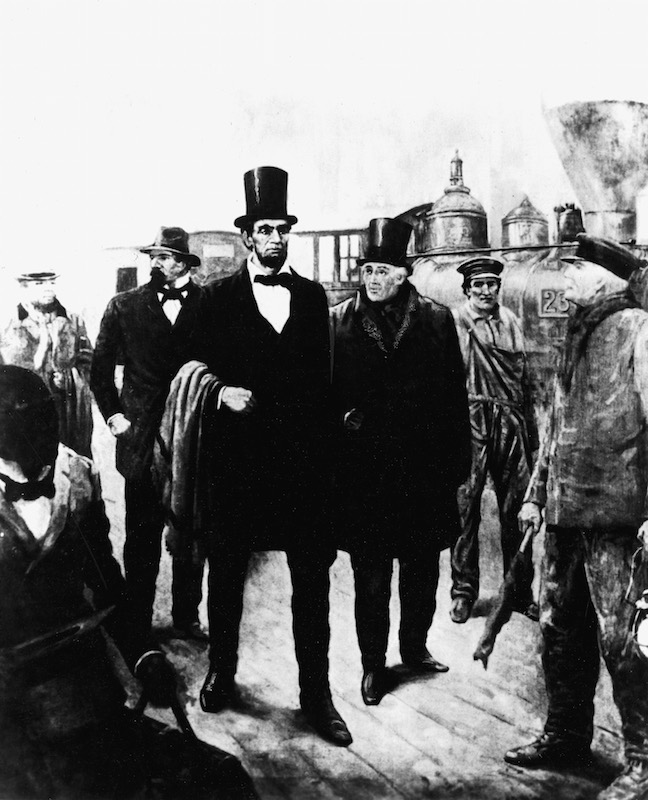
This piece is part of an ongoing series on the unsung women of history. Read more here.
In 1856, an attractive young widow presented herself at the offices of Allan Pinkerton. At the time, he was well on his way to fame as the founder of America’s first detective agency. Little did he realize that his visitor wasn’t just another pretty face; she was Kate Warne and she was soon to become the world’s first woman P.I.
Though Pinkerton gushed about Warne’s good looks and graceful vivacity, what really impressed him was her sense of purpose. She was looking for a job, she told him, and he should hire her. “She could go and worm out secrets in many places which it was impossible for male detectives to gain access,” Pinkerton wrote years later. “She had evidently given the matter much study.” Pinkerton agreed, and a legend was born.
Little is known of Warne’s life before she became a private eye, only that she was about 23 when she came to Pinkerton’s office and that she had a knack for acting and undercover work. She soon proved her worth to Pinkerton, befriending the wife of a man who had stolen thousands of dollars from a railroad company and helping find the hidden cash. But her most famous case—helping evade an assassination conspiracy against Abraham Lincoln—was still ahead of her.
“She was a brilliant conversationalist when so disposed, and could be quite vivacious,” Pinkerton later wrote, adding with the era’s characteristic misogyny that “she also understood that rarer quality in womankind, the art of being silent.” Whether talkative or quiet, Warne’s tact and savvy served her well in 1861. That’s the year that Pinkerton discovered that President-elect Lincoln, who was on a whistle-stop tour from Springfield, Ill., to Washington, D.C. ahead of his inauguration, was the target of an assassination plot by a group of Southern conspirators who hated his abolitionism.
Warne went undercover, heading to Baltimore under the guise of a Southern widow, and gained admission to the living rooms of the families of Southerners intent on killing the newly elected Abraham Lincoln—women who would naturally suspect a Northerner of bad intentions. The secession ribbon, or cockade, she wore with her clothing helped her further ingratiate herself among the Southern ladies. Warne passed the rumors and hints she learned in her conversations along to Pinkerton.
But her job was far from merely social. Details of the plot were now becoming clear. The assassination was supposed to take place during Lincoln’s scheduled stop in Baltimore, the only slaveholding city on his calendar. The President-elect would be especially vulnerable because of the publicity that went along with his celebratory journey. His only option would be to slip through Baltimore at night.
That’s where Warne came in. Pinkerton arranged a complex ruse that involved Lincoln traveling in the sleeper compartments of regular passenger trains to evade public notice. Warne was in charge of getting sleeper berths and keeping them free for the future president, then helping spirit him onto the train unnoticed.
Warne pretended she had a sick brother who needed complete peace and quiet on the train. She met a disguised Lincoln at the Philadelphia train station where he was waiting, greeted him as if he were her brother and accompanied him to the sleeper car. Together, they traveled the rest of the way to Washington, even enduring an hours-long delay when the sleeper car had to be transported via horse through Baltimore due to a noise ordinance.
Pinkerton and Warne worked together throughout the Civil War, posing as husband and wife and infiltrating various layers of Southern society. But though Warne’s detective chops were legendary, she did not live long enough to have many more adventures as a private investigator.
In late 1867, she suddenly contracted pneumonia and she died on Jan. 28, 1868 with Pinkerton at her side. She was around 35 years of age. Warne’s career may have been relatively short, but she still looms large as history’s first female P.I.—a woman not afraid to go into places no man could ever infiltrate.
More Must-Reads from TIME
- Why Biden Dropped Out
- Ukraine’s Plan to Survive Trump
- The Rise of a New Kind of Parenting Guru
- The Chaos and Commotion of the RNC in Photos
- Why We All Have a Stake in Twisters’ Success
- 8 Eating Habits That Actually Improve Your Sleep
- Welcome to the Noah Lyles Olympics
- Get Our Paris Olympics Newsletter in Your Inbox
Contact us at letters@time.com